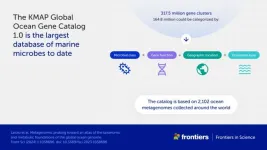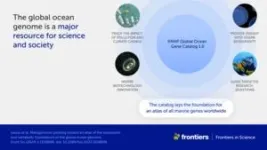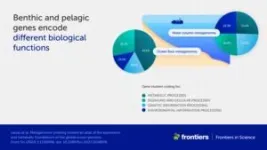(Press-News.org) The ocean is the world’s largest habitat, yet much of its biodiversity is still unknown. A study published in Frontiers in Science marks a significant breakthrough, reporting the largest and most comprehensive database of marine microbes to date – matched with biological function, location, and habitat type.
“The KMAP Global Ocean Gene Catalog 1.0 is a leap toward understanding the ocean’s full diversity, containing more than 317 million gene groups from marine organisms around the world,” said lead author Elisa Laiolo of the King Abdullah University of Science and Technology (KAUST) in Saudi Arabia. “The catalog focuses on marine microbes, which greatly impact human lives through their influence on the ocean’s health and the Earth’s climate.”
“The catalog is freely available through the KAUST Metagenomic Analysis Platform (KMAP),” added the study’s senior author, Prof Carlos Duarte, a faculty member at KAUST. “Scientists can access the catalog remotely to investigate how different ocean ecosystems work, track the impact of pollution and global warming, and search for biotechnology applications such as new antibiotics or new ways to break down plastics – the possibilities are endless!”
A feat of technological innovation and scientific collaboration
Researchers have been mapping marine biodiversity for hundreds of years, but faced various challenges to creating a full atlas of ocean life. One is that most marine organisms cannot be studied in a laboratory. The advent of DNA sequencing technologies overcame this by allowing organisms to be identified directly from ocean water and sediments.
“Since each species has its own set of genes, we can identify which organisms are in an ocean sample by analyzing its genetic material,” Laiolo explained. “Two technological advances have made this possible at scale.
“The first is the enormous increase in speed, and decrease in cost, of DNA sequencing technologies. This has allowed researchers to sequence all the genetic material in thousands of ocean samples.”
“The second is the development of massive computational power and AI technologies, which make it possible to analyze these millions of sequences.”
The team used KMAP to scan DNA sequences from 2,102 ocean samples taken at different depths and locations around the world. This advanced computing infrastructure identified 317.5 million gene groups, of which more than half could be classified according to organism type and gene function. By matching this information with the sample location and habitat type, the resulting catalog provides unprecedented information on which microbes live where and what they do.
“This achievement reflects the critical importance of open science,” said Duarte. “Building the catalog was only possible thanks to ambitious global sailing expeditions where the samples were collected and the sharing of the samples’ DNA in the open-access European Nucleotide Archive. We are continuing these collaborative efforts by making the catalog freely available.”
A wealth of scientific and industrial applications
The catalog has already revealed a difference in microbial activity in the water column and ocean floor, as well as a surprising number of fungi living in the ‘twilight’ mesopelagic zone. These and other insights will help scientists understand how microbes living in different habitats shape ecosystems, contribute to ocean health, and influence the climate.
The catalog also serves as a baseline for tracking the effect of human impacts like pollution and global warming on marine life. And it offers a wealth of genetic material that researchers can scan for novel genes that could be used for drug development, energy, and agriculture.
Toward a global ocean genome
The KMAP Ocean Gene Catalog 1.0 is a first step towards developing an atlas of the global ocean genome, which will document every gene from every marine species worldwide – from bacteria and fungi to plants and animals.
“Our analysis highlights the need to continue sampling the oceans, focusing on areas that are under-studied, such as the deep sea and the ocean floor. Also, since the ocean is forever changing – both due to human activity and to natural processes – the catalog will need continual updating,” said Laiolo.
Duarte cautions that despite its clear benefit, the future of the catalog is uncertain. A major obstacle is the status of international legislation on benefit-sharing from discoveries made in international waters.
“While the 2023 Treaty of the High Seas offers some solutions, it may inadvertently impede research by reducing incentives for companies and governments to invest. Such uncertainty must be resolved now we have reached the point where genetic and artificial intelligence technologies could unlock unprecedented innovation and progress in blue biotechnology,” he concluded.
The article is part of a Frontiers in Science multimedia article hub featuring an explainer as well as an editorial, viewpoint, and policy outlook from other eminent experts: Prof Enric Sala (National Geographic Society, USA), Prof Andreas Teske (University of North Carolina at Chapel Hill, USA), and Peggy Rodgers Kalas (International Ocean Policy Advisor to the Oceano Azul Foundation, and former Director of the High Seas Alliance).
END
Largest-ever study of ocean DNA has created essential catalog of marine life
From biotechnology innovation to tracking climate change impacts, the KMAP Global Ocean Gene Catalog 1.0 offers diverse applications for science and society
2024-01-16
ELSE PRESS RELEASES FROM THIS DATE:
Research aims to harness technology for improved heart and brain health
2024-01-16
Highlights:
Research teams share findings and progress on projects aimed at harnessing digital solutions — including text messaging, smartphone apps, wearable devices and artificial intelligence — to improve health, reduce health care disparities, empower people to better manage their health and wellness and enhance patient/clinician connectivity in a special issue of the Journal of the American Heart Association.
Topics in this issue include:
the effectiveness of an “EyePhone” smartphone application to diagnose ...
Living in poverty with chronic inflammation significantly increases heart disease and cancer mortality risk, study finds
2024-01-16
In the US, approximately 37.9 million people, or 11.4% of the population, lived below the poverty line in 2022. It has been well demonstrated that poverty negatively affects physical and mental health. For example, people living in poverty run a greater risk of mental illness, heart disease, hypertension, and stroke, and have a higher mortality and lower life expectancy. The mechanisms by which poverty impacts on health outcomes are manifold: for example, people experiencing poverty have reduced access to healthy food, clean water, safe housing, education, and healthcare.
Now, researchers have shown for the first time that the effects of poverty may combine in ...
Chronic inflammation and poverty are a ‘double whammy’ for mortality risk
2024-01-16
A new study led by a University of Florida College of Public Health and Health Professions researcher finds that people with chronic inflammation living in poverty have more than double the risk of dying from heart disease and nearly triple the risk of dying from cancer within the next 15 years. The findings are based on data representing 95 million Americans ages 40 and over.
While chronic inflammation and poverty are each known to increase mortality risk, when combined, the two factors appear ...
No increase in preventable illnesses, deaths in kids during pandemic, but delays in some diagnoses
2024-01-16
Despite major disruptions to health care systems during the COVID-19 pandemic, there was no significant increase in preventable conditions or deaths in children according to a large study published in CMAJ (Canadian Medical Association Journal) https://www.cmaj.ca/lookup/doi/10.1503/cmaj.221726.
To understand the effect of the pandemic on pediatric health care use and children's health, researchers looked at data on emergency visits, hospital admissions and deaths for children aged 0–17 years ...
Cannabis has no clear effect on treatment of opioid addiction, US study finds
2024-01-16
Cannabis is not an effective treatment for opioid addiction, a new peer-reviewed study of thousands of people being treated for opioid use disorder suggests.
Experts, publishing their results today in The American Journal of Drug and Alcohol Abuse, have found that cannabis is having no significant effect on peoples’ use of opioids, taken outside of medical guidance.
The findings have substantial implications for U.S treatment programmes, some of which still require patients to abstain from cannabis before they qualify for potentially life-saving treatment. This is based on ...
COVID-19 vaccine reduces long COVID in children
2024-01-16
Philadelphia, January 16, 2024 – Vaccination against SARS-CoV-2, the virus that causes COVID-19, reduces the risk of serious acute illness in children and adolescents. However, its role in protecting against persistent health problems in the months after COVID-19, or “long COVID,” was less clear. Now, researchers from 17 health systems in the U.S., in work led by investigators at the Children’s Hospital of Philadelphia (CHOP), have found that vaccination provides moderate protection against ...
First all-UK study of 67 million people reveals consequences of missed COVID-19 vaccines
2024-01-16
The first research study of the entire UK population highlights gaps in COVID-19 vaccine coverage. Between a third and a half of the populations of the four UK nations had not had the recommended number of COVID vaccinations and boosters by summer 2022.
Findings suggest that more than 7,000 hospitalisations and deaths might have been averted in summer 2022 if the UK had had better vaccine coverage, according to the paper, published today in The Lancet.
With COVID-19 cases on the rise and a new variant strain recently identified, this research provides a timely insight into vaccine ...
Trazadone and CBT no more effective than placebo for improving insomnia among long-term dialysis patients
2024-01-15
Below please find summaries of new articles that will be published in the next issue of Annals of Internal Medicine. The summaries are not intended to substitute for the full articles as a source of information. This information is under strict embargo and by taking it into possession, media representatives are committing to the terms of the embargo not only on their own behalf, but also on behalf of the organization they represent.
----------------------------
1. Trazadone and CBT ...
Climate change threatens global forest carbon sequestration, study finds
2024-01-15
Climate change is reshaping forests differently across the United States, according to a new analysis of U.S. Forest Service data. With rising temperatures, escalating droughts, wildfires, and disease outbreaks taking a toll on trees, researchers warn that forests across the American West are bearing the brunt of the consequences.
The study, led by UF Biology researchers J. Aaron Hogan and Jeremy W. Lichstein was published in the Proceedings of the National Academy of Sciences. The study reveals a pronounced regional imbalance in forest productivity, a key barometer of ...
Pacific kelp forests are far older that we thought
2024-01-15
The unique underwater kelp forests that line the Pacific Coast support a varied ecosystem that was thought to have evolved along with the kelp over the past 14 million years.
But a new study shows that kelp flourished off the Northwest Coast more than 32 million years ago, long before the appearance of modern groups of marine mammals, sea urchins, birds and bivalves that today call the forests home.
The much greater age of these coastal kelp forests, which today are a rich ecosystem supporting otters, sea lions, seals, and many birds, fish and crustaceans, means that they likely were a ...
LAST 30 PRESS RELEASES:
GLP-1 drugs associated with reduced need for emergency care for migraine
New knowledge on heritability paves the way for better treatment of people with chronic inflammatory bowel disease
Under the Lens: Microbiologists Nicola Holden and Gil Domingue weigh in on the raw milk debate
Science reveals why you can’t resist a snack – even when you’re full
Kidney cancer study finds belzutifan plus pembrolizumab post-surgery helps patients at high risk for relapse stay cancer-free longer
Alkali cation effects in electrochemical carbon dioxide reduction
Test platforms for charging wireless cars now fit on a bench
$3 million NIH grant funds national study of Medicare Advantage’s benefit expansion into social supports
Amplified Sciences achieves CAP accreditation for cutting-edge diagnostic lab
Fred Hutch announces 12 recipients of the annual Harold M. Weintraub Graduate Student Award
Native forest litter helps rebuild soil life in post-mining landscapes
Mountain soils in arid regions may emit more greenhouse gas as climate shifts, new study finds
Pairing biochar with other soil amendments could unlock stronger gains in soil health
Why do we get a skip in our step when we’re happy? Thank dopamine
UC Irvine scientists uncover cellular mechanism behind muscle repair
Platform to map living brain noninvasively takes next big step
Stress-testing the Cascadia Subduction Zone reveals variability that could impact how earthquakes spread
We may be underestimating the true carbon cost of northern wildfires
Blood test predicts which bladder cancer patients may safely skip surgery
Kennesaw State's Vijay Anand honored as National Academy of Inventors Senior Member
Recovery from whaling reveals the role of age in Humpback reproduction
Can the canny tick help prevent disease like MS and cancer?
Newcomer children show lower rates of emergency department use for non‑urgent conditions, study finds
Cognitive and neuropsychiatric function in former American football players
From trash to climate tech: rubber gloves find new life as carbon capturers materials
A step towards needed treatments for hantaviruses in new molecular map
Boys are more motivated, while girls are more compassionate?
Study identifies opposing roles for IL6 and IL6R in long-term mortality
AI accurately spots medical disorder from privacy-conscious hand images
Transient Pauli blocking for broadband ultrafast optical switching
[Press-News.org] Largest-ever study of ocean DNA has created essential catalog of marine lifeFrom biotechnology innovation to tracking climate change impacts, the KMAP Global Ocean Gene Catalog 1.0 offers diverse applications for science and society



